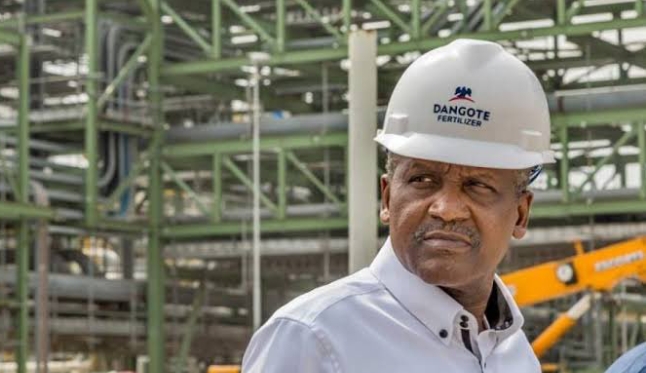Petroleum Products Retail Outlets Owners Association of Nigeria (PETROAN) on Monday raised alarm over the plan by Dangote Refinery to start direct nationwide distribution of petrol and diesel.
In a statement issued on Monday, PETROAN spokesperson, Mr Joseph Obele, said the move by Dangote could have consequences on the country’s downstream sector,
According to him, such consequences include widespread job losses and the shutdown of small businesses.
Recall that on June 15, Dangote Refinery disclosed its plan to distribute petrol and diesel directly to consumers across Nigeria.
Reacting to this development, PETROAN National President, Dr Billy Gillis-Harry, warned that such strategy could create a monopolistic market structure, stifling competition and threatening thousands of livelihoods in the sector.
“With a production capacity of 650,000 barrels per day, Dangote Refinery should be positioning itself to compete with global refiners rather than engaging in direct distribution within Nigeria’s downstream sector,” Gillis-Harry said.
He stated that this move undermines the survival of independent marketers, truck owners, filling station operators, and modular refinery operators who rely on the existing supply chain structure.
Gillis-Harry noted that Dangote’s dominance could lead to higher fuel prices due to reduced competition and business closures across the fuel retail landscape.
The president said that the situation could also lead to massive job losses among truck drivers, petroleum product suppliers, and station operators
He cautioned that the introduction of 4,000 new Compressed Natural Gas (CNG)-powered tankers by Dangote, which might lower transportation costs, could pose a threat to the jobs of traditional tanker drivers and owners.
“Filling station operators, truck owners, telecom diesel suppliers, and modular refineries are all at risk.
“Dangote’s approach could trigger a pricing penetration strategy aimed at capturing market share and forcing competitors out of the market,” Gillis-Harry added
The PETROAN boss said that Dangote’s market influence might allow for price setting that could disadvantage consumers, noting similar patterns in other industries where the conglomerate operates.
Gillis-Harry, therefore, urged the Executive Director of the Nigerian Midstream and Downstream Petroleum Regulatory Authority (NMDPRA) and the Minister of State for Petroleum Resources to urgently introduce price control mechanisms and enforce fair competition policies.
“Competition must be protected and encouraged to safeguard consumers, preserve jobs, and maintain a healthy petroleum distribution ecosystem,” he stressed.
Job loss, business shutdown loom as Dangote adopts forward integration strategy – PETROAN
Similarly, National President of PETROAN, Dr Billy Gillis-Harry has raised concerns on Dangote Refinery’s forward integration strategy on fuel distribution, cautioning that it could lead to a monopoly in disguise.
Speaking on Monday, Gillis-Harrysaid it could pose a significant job loss threat to Nigeria while many fuel stations would be forcefully shutdown.
Dangote Petroleum Refinery on Sunday announced the commencement of a significant national initiative designed to transform Nigeria’s fuel distribution landscape.
The refinery said effective from August 15, it would begin distribution of fuel and diesel to marketers, dealers, manufacturers, telecommunication firms, aviation, and other large users nationwide, with free logistics to boost distribution network.
To ensure smooth take-off of this scheme, Dangote Refinery had invested in the procurement of 4,000 brand-new Compressed Natural Gas (CNG)-powered tankers.
The refinery is also investing in CNG stations, commonly referred to as daughter booster stations, supported by a fleet of over 100 CNG tankers across the country to ensure seamless product distribution and eliminate logistics costs.
Reacting to this, Gillis-Harry argued that with a production capacity of 650,000 barrels per day, Dangote Refinery should be competing with global refineries, not operating as a distributor in the downstream sector.
“This massive refinery, one of the largest in sub-Saharan Africa, is expected to satisfy domestic fuel demand and export surplus products.
“PETROAN has previously raised alarms about Dangote’s intentions to dominate the downstream sector, citing concerns that the company may leverage its market power to fix prices, limit competition, and exploit consumers, much like it has done in other sectors.
“PETROAN warns that Dangote’s tactics may include a pricing penetration strategy, where they reduce prices to capture market share, with the ultimate goal of forcing other filling
station operators to quit the market.
“This could lead to a massive shutdown of filling stations across Nigeria, resulting in widespread job losses,” he said.
He said the introduction of 4,000 brand-new CNG-powered tankers by Dangote Refinery posed a significant threat to the livelihoods of thousands of truck drivers and owners.
He explained that while CNG trucks may offer a lower cost of transporting petroleum products, the shift could lead to widespread job losses in the industry.
Speaking on its impact on various stakeholders, he said the adoption of a forward integration strategy by Dangote Refinery would greatly affect Modular Refineries, because their operations and market share may be threatened by Dangote’s dominance.
He said it would affect the Truck Owners because job losses could occur due to its direct supply and CNG-powered tankers while Filling Station Operators may shut down forcefully due to Dangote’s pricing penetration strategy and dominance.
“It will affect local suppliers of petroleum products and telecom diesel suppliers because their businesses may be negatively impacted by Dangote’s direct supply to end-users.
“It is obvious that Dangote plans to gain full monopoly of the downstream sector, which would enable the company to exploit Nigeria’s petroleum consumers.
“This could lead to higher prices, reduced competition, and decreased economic efficiency,” he said.
He called on the Nigerian Midstream and Downstream Petroleum Regulatory Authority (NMDPRA) and the Ministry of Petroleum to put in place price control mechanisms to prevent any form of monopoly and protect consumers.


